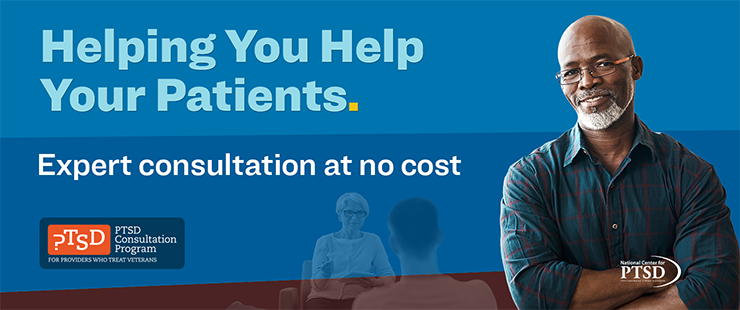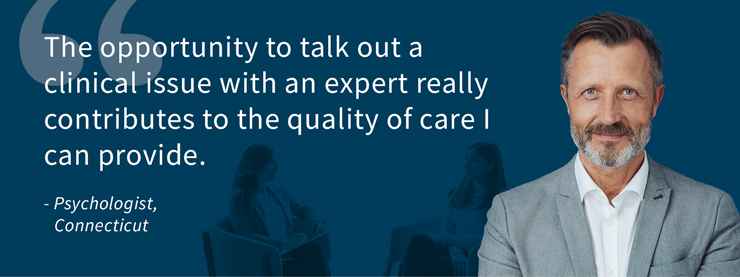PTSD: National Center for PTSD
Consultation Program

Discover PTSD Consultation Program (Promo Page)
The Department of Veterans Affairs, National Center for Posttraumatic Stress Disorder's PTSD Consultation Program offers free expert consultation, education, and resources to VA and non-VA (community-based) providers treating Veterans.

The program is easy to use. Ask us a question by calling (866-948-7880) or emailing (PTSDconsult@va.gov) us today. We won't ask you to fill out any forms, and we respond to most requests the same day. No question is too big or too small.
Our team of expert clinicians includes psychologists, physicians, social workers, and pharmacists who have designed, implemented, and led PTSD treatment programs and consulted on thousands of PTSD cases. Our consultants are ready to provide consultation via email or phone on just about anything related to Veterans and trauma or PTSD.
Sign up for our email newsletter to stay up to date on the latest continuing education opportunities and best practices regarding treatment for PTSD.
Providers: you can ask us anything on treating Veterans with PTSD.
- How can I know if my client has PTSD?
- Can medications treat PTSD?
- What training is available if I'm new to treating PTSD?
- What should I do if my client's PTSD symptoms are getting worse?
- What if my client has some cognitive impairments?
- What's the latest on cannabis and PTSD?
- How should racial trauma be treated?
- How do I know if my client needs residential treatment for PTSD?
- What's the difference between PTSD and moral injury?
- Do you have handouts for family members in other languages?
- How can we educate our non-clinical staff about PTSD?
- Can you help me get my patient un-stuck in treatment?
- Can I do trauma treatment if my client is pregnant?
- What is the best way to treat PTSD?
- What types of traumas meet PTSD criteria?
- What are the treatment recommendations for PTSD with older adults?
- Does exposure therapy make PTSD symptoms worse?
- What PTSD assessment measures do you recommend?
- How can I make sure my client is ready for PTSD treatment?
- How can I receive training in the CAPS-5?
- How do I treat PTSD with a patient with suicide risk?
- How do I treat PTSD if my client also has other mental health issues?
- What is complex PTSD?
- How do I help my client decide on a treatment for PTSD?
- What self-help resources do you recommend for PTSD?
- How do I treat PTSD when a client also has a substance use disorder?
- How do I address sleep problems in PTSD treatment?
- Should we involve family members in PTSD treatment?
- What are the most effective PTSD treatments?
- What should I do if my patient is too complex for trauma focused treatment?
What providers like you tell us they find helpful about the program:
- Ensures that you have the most up-to-date information and resources
- Saves time when researching answers to patient and family questions
- Prevents feeling alone or siloed when you feel stuck
- Provides an in-depth perspective that is not always possible for therapists who are generalists
- The opportunity to get a second opinion when one would be helpful
- Responses are tailored to the specific question and based on a thorough knowledge of the research literature
Whether you are new to treating Veterans with PTSD or an expert with years of experience, we can help. No question is too big or too small.





























